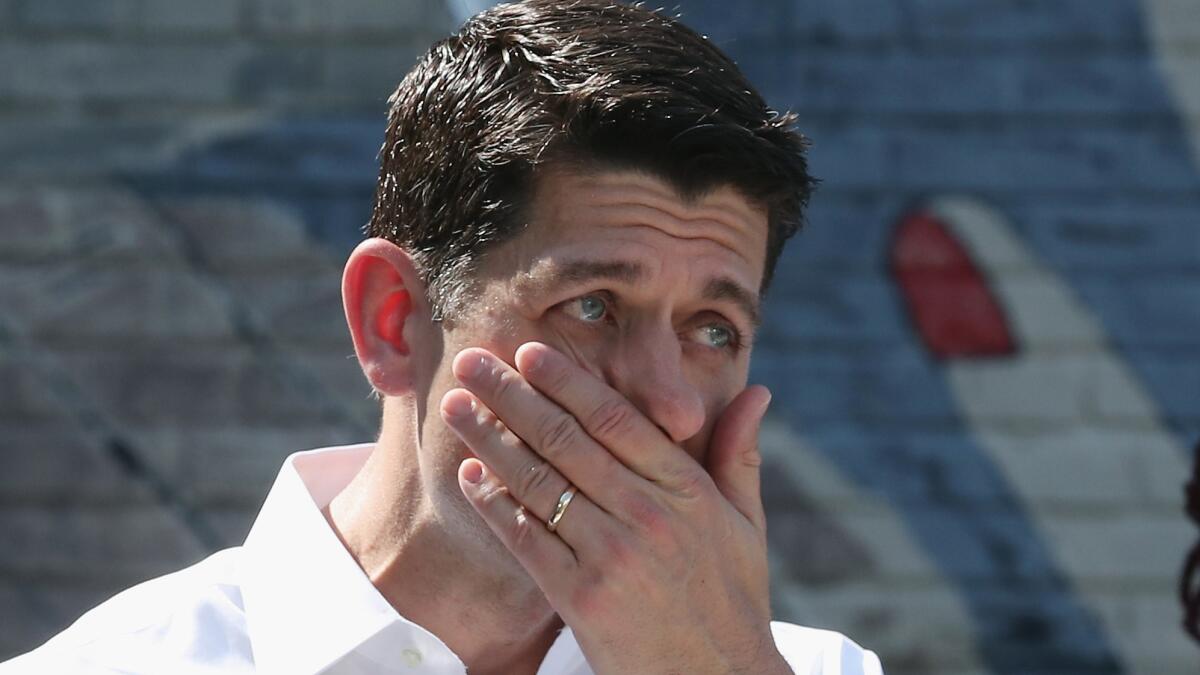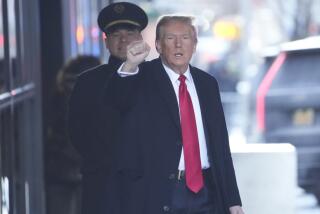Top Republican congressional leaders denounce Donald Trump’s attacks on judge

A day that could have been another victory lap for Donald Trump veered into more chaos for the new Republican standard-bearer, as he faced fury from top party leaders Tuesday and the defection of a GOP senator over racially charged comments calling into question the impartiality of a federal judge because he is of Mexican descent.
The day’s roller-coaster was perhaps the clearest sign yet that Trump’s formula of using controversy to fuel his primary campaign presents a stiffer challenge to him and his party in the general election.
After unusually harsh criticism from House Speaker Paul D. Ryan (R-Wis.) and Senate Majority Leader Mitch McConnell (R-Ky.) early Tuesday, Trump tried to contain the mess on a day when he was set to win Republican primaries in California and four other states.
He insisted in a statement that his comments about U.S. District Judge Gonzalo Curiel, who is overseeing a lawsuit against the Trump University real estate course, had been “misconstrued as a categorical attack against people of Mexican heritage.”
Yet Trump’s statement was hardly conciliatory. Nor did it seem likely to dispel the notion that Trump was linking Curiel’s ethnicity to his attack on his fitness to hear the case.
“I do not feel that one’s heritage makes them incapable of being impartial, but, based on the rulings that I have received in the Trump University civil case, I feel justified in questioning whether I am receiving a fair trial,” Trump said in a statement that included testimonials praising Trump University.
He added that because immigration is one of the “core issues of my campaign,” he has “concerns as to my ability to receive a fair trial.”
Election 2016 | Live coverage on Trail Guide | Track the delegate race | Sign up for the newsletter
Trump has questioned Curiel’s impartiality based on his ethnicity several times in recent days, and has implored his top supporters to keep up the attack, despite pleas from his own advisors to retreat.
He told the Wall Street Journal, for example, that the Indiana-born Curiel’s heritage is “an absolute conflict.”
“I’m building a wall,” Trump said. “It’s an inherent conflict of interest.”
Trump ended the day by doing something he rarely does: reading a prime-time speech from a teleprompter.
The 17-minute address, delivered to supporters in front of his family at the Trump National Golf Club Westchester here, was designed to reassure the party, with a promise to fight special interests and deliver a broadside attack on Hillary Clinton next week.
“I understand the responsibility of carrying the mantle,” Trump said, “and I will never ever let you down.”
Trump’s attempt to finally end the controversy followed a days-long onslaught of criticism from fellow Republicans, who condemned the remarks about the judge and rushed to distance themselves from the broader backlash against them. Yet most were unwilling to rescind their endorsement of Trump, given the support he still retains among Republican voters.
The party was in full panic Tuesday over how to deal with a candidate who appeared uninterested in the advice of party leaders and some in his own campaign.
Ryan, who endorsed Trump only last week, called the businessman’s remarks a “textbook definition of a racist comment.”
It was a striking and unprecedented rebuke — the country’s top Republican leader accusing its presidential nominee of racism.
Nearly as stunning, McConnell piled on, urging Trump to “start talking about the issues the American people care about.… Quit attacking the various people that you competed with and various minority groups, and get on message.”
Republicans openly feared Trump was risking the party’s electoral chances in down-ticket races, particularly in the Senate. Sen. Mark Kirk, an Illinois Republican facing a tough reelection campaign, announced he would not support Trump for president.
“While I oppose the Democratic nominee, Donald Trump’s latest statements, in context with past attacks on Hispanics, women and the disabled like me, make it certain that I cannot and will not support my party’s nominee for president regardless of the political impact on my candidacy or the Republican Party,” Kirk said.
Sen. Bob Corker (R-Tenn.), chairman of the Senate Foreign Relations Committee, has worked to nudge Trump to change his behavior.
“I hope this isn’t the pattern that’s going to occur between now and November,” said Corker, who only days ago was the subject of speculation that he would be Trump’s running mate. He said it could be problematic if the flare-ups continue.
“They’re recognizing he’s not going to change,” Rick Wilson, a GOP strategist who has long criticized Trump, said of fellow Republicans. “There’s no better Donald Trump. There’s no presidential Donald Trump. You buy into it; you’re stuck with it.”
Wilson said he has been fielding calls from members of Congress and top aides wringing their hands over Trump’s remarks.
“This was the week when Republicans realized that there are no better angels of Trump’s nature, only gargoyles,” added John J. Pitney, a professor of American politics at Claremont McKenna College and a former Republican policy aide.
New Jersey Gov. Chris Christie, a fellow Republican and top Trump supporter, tried his best defense Tuesday as he cast his vote in his state’s primary.
“I know Donald Trump. I’ve known him for 14 years. And Donald Trump is not a racist,” Christie said.
Another top Republican, Sen. Orrin G. Hatch of Utah, sounded a similar plea for leniency, saying a person as new to politics as Trump will say “stupid” and “outrageous” things.
“Be nice to him,” said Hatch. “He’s a poor first-time candidate.”
Bierman reported from Briarcliff Manor and Mascaro from Washington.
Twitter: @noahbierman, @lisamascaro
ALSO:
What presumptive nominee? California Democrats still have some things to say
Clinton eyes history while Sanders bucks for an upset as 6 states, led by California, hold primaries
UPDATES:
6:53 p.m.: This article was updated with comments from Trump.
5:15 p.m.: This article was updated with comments from Republican analysts.
3:18 p.m.: This article was updated with a statement from Donald Trump and comments from other Republicans.
This article was originally published at 10:03 a.m.
More to Read
Get the L.A. Times Politics newsletter
Deeply reported insights into legislation, politics and policy from Sacramento, Washington and beyond. In your inbox three times per week.
You may occasionally receive promotional content from the Los Angeles Times.








